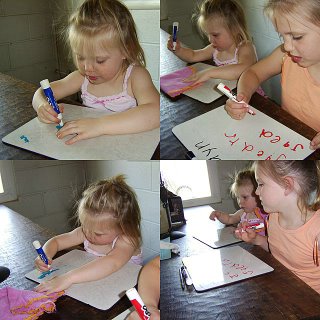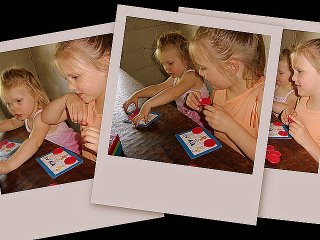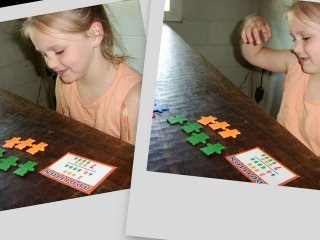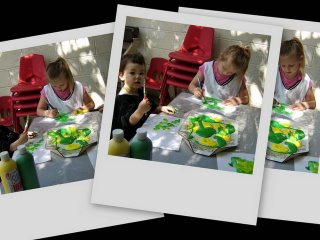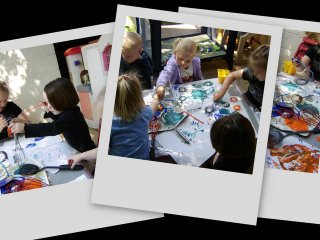Wednesday, October 18, 2006
Friday, September 01, 2006
Thursday, August 10, 2006
Tuesday, August 01, 2006
Tuesday, July 25, 2006
Monday, July 24, 2006
Spiders
Monday, July 17, 2006
Tips When Choosing Child Care
Parents:
When choosing child care don't be afraid to ask questions!
Your child's day...
When choosing child care don't be afraid to ask questions!
Your child's day...
- Is there a daily schedule?
- What is the meal system (do I have to bring or does the Provider supply)?
- Where will my child sleep?
- What is the sleep policy (are non-resting children accomodated; what is the resting philosophy)?
- What types of activities are available?
- What is the philosophy of the child care (is it teacher directed or child directed or somewhere inbetween?) BTW, both are very good, but one might be a better fit for an individual, (and their family philosophies regarding child education), than others.
- Is there an emergency plan that you feel comfortable with?
- Are the activities age appropriate, are the structures and toys free from damage?
- Does the family home or center meet all of the criteria to remain licensed?
- (plugs covered, current (and correct) CPR and First Aid Certification, no poisionous plants in yards, fences safe, windows free from breakage, walls free from cracked paint, all poisonous materials stored in locked cabinets or above 5ft (I think 6ft is better). If you have questions you can call licensing @ (916) 875-2808 and ask for the worker of the day.
Your Provider....
- What is the Philosophy of the center or family home? (Views on toilet learning, family communication, learning, meal times, etc). Is it similar to yours?
- Is there a posted curriculum?
- How often do children partake in a scheduled curriculum, if at all?
- What is the education level of the teacher/provider? (BTW, just because a person has a degree in math or english, it does not necessarily mean that they have the temperment to work with children; OBSERVE!)
Hygene...
- What is your initial feeling of the overall apperance of the site. (If a site is in disorder, it could mean that in an emergency they might not be able to find your child's file or other important paper work).
- Is the site overly dirty? (There will be a certain amout of messiness because a good provider wants the children to become heavily involved in play. However mold, and lots of dust/cobwebs could be health issues, esp. for children with asthma or alergies).
- Does the site have a posted toy cleaning and sanitation plan? (are mats, plastic and fabric toys and structures routinely washed and sanitized on a schedule?)
- What is the written health policy?
- How often are hands washed? (Does provider have paper or individual towels or one towel for everyone?)
- Does the provider look clean? (clean hands - when not involved in projects, neat appearance?)
Dangers...
- What are the policies for field trips (how many adults to children)?
- what are the proceedures for serious medical treatment?
- Does your provider carry Liability insurance for the child care and Liability auto insurance? If not are you comfortable with this?
These are some of the questions Parents/families can ask providers. I always tell parents that if they are uncomfortable for any reason to trust their instincts and keep searching until they have the right match.
I will be posting on what providers can do to protect themselves and how to inteview to find a good parent/provider fit. HINT: alot of it has to do with the above questions.
Thursday, July 13, 2006
Friday, June 30, 2006
Help With Hitting in a Group Setting: Sharing.
A parent recently wrote:
I have been posed with a problem. I have a bit of a hitter on my hands. My 2 year old son has been going to daycare for about a month and a half now and started hitting some. Occasionally he leaves a little mark, but I think out of frustration really (he needs to learn how to share as he is an only child). He is in a daycare with all boys, and one of the moms (a mom of brothers), has said it was her sons or mine. So I am getting the boot (I can understand where she is coming from, I am not bad mouthing her), but I don't know what to do. He's not a bad kid. My current provider really cares for him and she hates doing this, but she has to do what she has to do for her own business. So I have a week to find new placement. Is there anyone who can help me? I don't know if I should get someone with as little kids as possible (maybe 1 or 2), or what. I need a place to take him otherwise I have to quit my new job. I don't want to give up on him, but he won't learn if everyone else gives up on him too. I am rambling now so please send me some advice letting me know what I should do. Thank you.
This was my reply (if you are experiencing this type of issue you might want to read):
Hi. I'm a Licensed child care provider in Sac. I usually don't offer advice because I don't want to seem like I have all the answers, because I don't --nobody does. Don't feel bad; all children will test limits and are in the process of learning socially acceptable behaviors.
I can offer some advice. I realize your job is on the line and it can be very stressful to work when you have a young child.
1. Try to find out what is causing the behavior (sounds like sharing is the issue?). It is very helpful to find out what is triggering him to hit so that you can intervene and help find alternatives to hitting (like using his words to ask for what he wants or walking away until the toy is available).
The next tips are the most useful in stopping the behavior.
2. Set a limit. Before he hits (when he is calm and not involved in the behavior) let him know:
"It's not okay to hit. If you hit You will have to sit on the green chair," (or what ever the consequence).
I know this sounds simple and you may have tried this before, but I have confidence if you repeat these steps over and over you will have success. He has to loose the privilege of being in the situation. Here's the rest:
3. Let him know it's okay to be angry but not okay to hit. Remember to use "I" sentences ("I want you to walk away from your friend. I don't like it when you hurt your friend, etc.").
4. You can always give him something that it IS appropriate to hit (a pillow, stuffed animal etc.). I always look at the ones who are quick to react as my "sensitive ones." Sometimes they need a security item to take with them that no one else can have (blanket, stuffed animal). I used to be a hitter as a child and I had the whole lot, stuffed animal, thumb, blanket -- you name it. I needed it to calm down.
I would never say anything against a another provider, especially one I don't know, but please consider the following:
1. The time of the day the occurrences are taking place (your son could be tired, hungry stressed), the time of day plays an important part in your child's patience level and irritability level. A good provider will be observing their children in care for these things and how and why they interact the way they do with others.
2. The main reason a child hits (or acts out physically) is because they become so overwhelmed with emotion that they think with the survival part of their brain (the middle lower section). Quick intervention by the provider walking through the situation verbally can help him calm down enough to use the rational part of his brain.
3. Does your provider have Early Childhood Education classes? Someone who doesn't fully understand how children react in frustrating situations will have trouble helping children work on conflict resolution.
4. Your provider (your past one, as well as your future one) will not be successful with children until they realize that young children, especially energetic boys, need physical stimulation (climbing structures, a few versions of the same type of toy, ample time outside). Bored children tend to squabble. I know its hard for a provider to be everywhere at once, but your son has done this more than once, so she should've been "shadowing" him, or staying in the background unnoticed to observe his interactions.
This is my main advice for you: Yes, it's great that you are honest about your son, but when looking for care it is the provider's job to show children the appropriate behaviors. When you interview a provider, ask them how they would handle a situation where children were not sharing and another hits. There will be someone with the right answer. Don't stop looking until you hear the right one.
I find that when parents are looking for child care it is important to find these things in the child care environment:
Enough toys for everyone/physical and gross motor activities and equipment/education/conflict resolution skills/observation skills/the ability to observe and to communicate what they observe in a positive way to the parent/positive discipline skills.
I would offer my service but I am located by the Sac Zoo and I only have a Monday-Tuesday spot left. I hope that this helps. Don't blame him or yourself. It's a developmentally appropriate situation, even if is upsetting.
Thanks.
Aimee Nester
Here's my website: http://0664719.tripod.com
I have been posed with a problem. I have a bit of a hitter on my hands. My 2 year old son has been going to daycare for about a month and a half now and started hitting some. Occasionally he leaves a little mark, but I think out of frustration really (he needs to learn how to share as he is an only child). He is in a daycare with all boys, and one of the moms (a mom of brothers), has said it was her sons or mine. So I am getting the boot (I can understand where she is coming from, I am not bad mouthing her), but I don't know what to do. He's not a bad kid. My current provider really cares for him and she hates doing this, but she has to do what she has to do for her own business. So I have a week to find new placement. Is there anyone who can help me? I don't know if I should get someone with as little kids as possible (maybe 1 or 2), or what. I need a place to take him otherwise I have to quit my new job. I don't want to give up on him, but he won't learn if everyone else gives up on him too. I am rambling now so please send me some advice letting me know what I should do. Thank you.
This was my reply (if you are experiencing this type of issue you might want to read):
Hi. I'm a Licensed child care provider in Sac. I usually don't offer advice because I don't want to seem like I have all the answers, because I don't --nobody does. Don't feel bad; all children will test limits and are in the process of learning socially acceptable behaviors.
I can offer some advice. I realize your job is on the line and it can be very stressful to work when you have a young child.
1. Try to find out what is causing the behavior (sounds like sharing is the issue?). It is very helpful to find out what is triggering him to hit so that you can intervene and help find alternatives to hitting (like using his words to ask for what he wants or walking away until the toy is available).
The next tips are the most useful in stopping the behavior.
2. Set a limit. Before he hits (when he is calm and not involved in the behavior) let him know:
"It's not okay to hit. If you hit You will have to sit on the green chair," (or what ever the consequence).
I know this sounds simple and you may have tried this before, but I have confidence if you repeat these steps over and over you will have success. He has to loose the privilege of being in the situation. Here's the rest:
3. Let him know it's okay to be angry but not okay to hit. Remember to use "I" sentences ("I want you to walk away from your friend. I don't like it when you hurt your friend, etc.").
4. You can always give him something that it IS appropriate to hit (a pillow, stuffed animal etc.). I always look at the ones who are quick to react as my "sensitive ones." Sometimes they need a security item to take with them that no one else can have (blanket, stuffed animal). I used to be a hitter as a child and I had the whole lot, stuffed animal, thumb, blanket -- you name it. I needed it to calm down.
I would never say anything against a another provider, especially one I don't know, but please consider the following:
1. The time of the day the occurrences are taking place (your son could be tired, hungry stressed), the time of day plays an important part in your child's patience level and irritability level. A good provider will be observing their children in care for these things and how and why they interact the way they do with others.
2. The main reason a child hits (or acts out physically) is because they become so overwhelmed with emotion that they think with the survival part of their brain (the middle lower section). Quick intervention by the provider walking through the situation verbally can help him calm down enough to use the rational part of his brain.
3. Does your provider have Early Childhood Education classes? Someone who doesn't fully understand how children react in frustrating situations will have trouble helping children work on conflict resolution.
4. Your provider (your past one, as well as your future one) will not be successful with children until they realize that young children, especially energetic boys, need physical stimulation (climbing structures, a few versions of the same type of toy, ample time outside). Bored children tend to squabble. I know its hard for a provider to be everywhere at once, but your son has done this more than once, so she should've been "shadowing" him, or staying in the background unnoticed to observe his interactions.
This is my main advice for you: Yes, it's great that you are honest about your son, but when looking for care it is the provider's job to show children the appropriate behaviors. When you interview a provider, ask them how they would handle a situation where children were not sharing and another hits. There will be someone with the right answer. Don't stop looking until you hear the right one.
I find that when parents are looking for child care it is important to find these things in the child care environment:
Enough toys for everyone/physical and gross motor activities and equipment/education/conflict resolution skills/observation skills/the ability to observe and to communicate what they observe in a positive way to the parent/positive discipline skills.
I would offer my service but I am located by the Sac Zoo and I only have a Monday-Tuesday spot left. I hope that this helps. Don't blame him or yourself. It's a developmentally appropriate situation, even if is upsetting.
Thanks.
Aimee Nester
Here's my website: http://0664719.tripod.com
Thursday, May 18, 2006
A Sample of a Week's Curriculum Theme...

This week's theme is "Water."
Monday: What animals live in the water?
Tuesday: What ways do we have fun in and near the water?
Wednesday: Water Safety! (How can we be safe in/near the water?)
Thursday: Our bodies need water and so do plants and animals
Friday: How do we use water every day?
Additional: Sign language (water/sick/drink/grow); daily calendar activity; circle songs; the letter "M"
A Typical Day's Activities
Wednesday, May 17, 2006
Here's An Idea...
This is a fun post (click the green words)...
Instead of being a couch potato or vegging on the computer...
Instead of being a couch potato or vegging on the computer...
Do something outside with your kids!
Tuesday, May 02, 2006
Monday, May 01, 2006
Wednesday, April 26, 2006
Friday, April 21, 2006
Gak, Glurch and Goo, Oh My!!
Some call it "Gak," a recipe for strechy, slimey goo that kids love to play with. Click on this green sentence for the link to the recipe (Kinder art calls it "Glurch" but it's the same thing).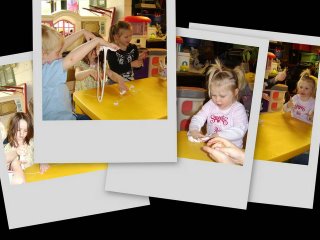
What can Children learn from this? Well, it's another one of those fabulous activities that promote self competence and team building skills.
It's also a (non-edible) cooking project. Though we did not make this batch today, making Gak is a good way to teach children measurement, and transitional changes that take place when things are mixed together and become something all together different, i.e. mixing cake ingredients together to make a wet mixture, baking and discovering a "dry" cake.
Very valueable science concepts.


What can Children learn from this? Well, it's another one of those fabulous activities that promote self competence and team building skills.
It's also a (non-edible) cooking project. Though we did not make this batch today, making Gak is a good way to teach children measurement, and transitional changes that take place when things are mixed together and become something all together different, i.e. mixing cake ingredients together to make a wet mixture, baking and discovering a "dry" cake.
Very valueable science concepts.

Wednesday, April 19, 2006
Superunit
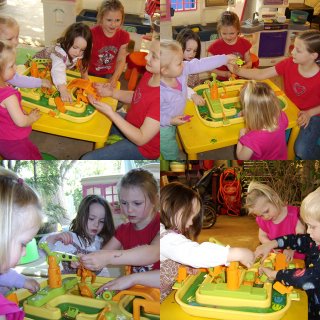
Our friends enjoyed a water play activity this morning.
It can actually be so much more than that upon closer examination. What they are engaged in is a "Superunit" activity. Which means that this particular water project can be used in more than one way, by more than one person and children can learn more than one concept from it.
Here are some discoveries children can make for themselves using this activity:
1. Some things sink while others float.
2. The ability to compromise and share while working in a group. Skills I try to promote as much as possible -- because we all want our children to be able to work in a positive way with others.
3. Balance. Hooking a scoop on a crane, filling a floating boat with sand, etc.
4. Cause and effect. If I crash into the water with my boat, it might get me wet.
Wednesday, April 12, 2006
Our Seasonal Art Collage in 3 Parts
Here we see our friends using markers to create images on their egg shapes. The picture collages below show that our friends are progressing through 3 steps of this project: 1. The begining (using markers, colored pencils) . 2.  The middle, (the meaty part including scissors, glitter, stickers and other collage materials), and finally 3. The end (the finished product, clean up).
The middle, (the meaty part including scissors, glitter, stickers and other collage materials), and finally 3. The end (the finished product, clean up).
Traditional holidays are not celebrated here, instead we honor the first part of Spring in which birds laying eggs is a part. This week we have discussed eggs, what comes out of them who lays them, who does not, and how they hatch.
 The middle, (the meaty part including scissors, glitter, stickers and other collage materials), and finally 3. The end (the finished product, clean up).
The middle, (the meaty part including scissors, glitter, stickers and other collage materials), and finally 3. The end (the finished product, clean up).Traditional holidays are not celebrated here, instead we honor the first part of Spring in which birds laying eggs is a part. This week we have discussed eggs, what comes out of them who lays them, who does not, and how they hatch.

Subscribe to:
Comments (Atom)



